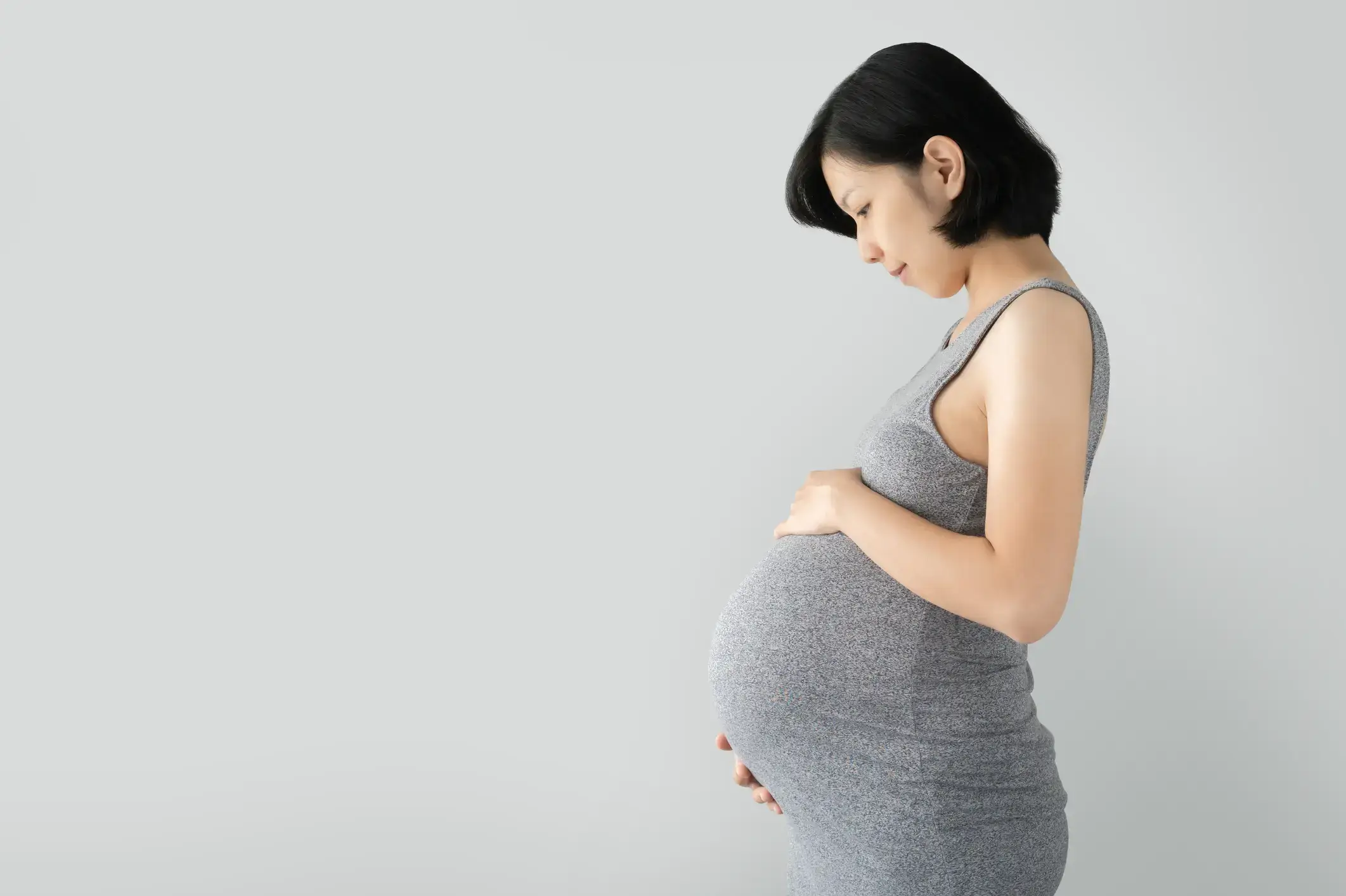5 mins read
Mental Health During Pregnancy: Symptoms & Treatment
Author: Forth
June 5, 2023
Fertility & Pregnancy

- What Can Cause Mental Health Issues During Pregnancy
- Fear of the Unknown
- Physical Illness
- Previous Pregnancy Loss
- Anxiety
- Depression
- Fear of giving birth (tokophobia)
- Obsessive-Compulsive Disorder (OCD)
- Post-Traumatic Stress Disorder (PTSD)
You’re expecting a child, whether your first or third, it’s an exciting time of your life. But what if you don’t feel that way? What if you feel a bit lost, scared or anxious rather than the glowing expectant mother everyone expects you to be?
If you’re feeling like this, then be reassured you’re not alone, many women experience anxiety or depression during pregnancy, in fact it affects 1 in 10 women in the UK[1].
In this blog we explore the causes of why you’re feeling like this and advice on how to support your mental health during pregnancy.
What Can Cause Mental Health Issues During Pregnancy
Although pregnancy is often thought of as a time of joy and excitement, it can also be a challenging time for many women. Mental health issues are not uncommon during pregnancy, and several factors can contribute to their development.
Lack of Support
Having a strong support system during pregnancy can make a big difference to your mental health. Women who lack support from friends or family members may be more likely to experience depression or anxiety during pregnancy.
Fear of the Unknown
Pregnancy can be a time of uncertainty, particularly for first-time mothers. Women may worry about their ability to care for a newborn, the impact that a baby will have on their relationship, or how they will balance work and family responsibilities. These fears can contribute to feelings of anxiety or depression during pregnancy.
Physical Illness
Physical illness before and during pregnancy can also impact mental health. Women who experience complications like hyperemesis gravidarum (severe nausea and vomiting) or bed rest may feel isolated and helpless, which can contribute to depression or anxiety.
Previous Pregnancy Loss
Women who have experienced a previous pregnancy loss may be at increased risk of developing mental health issues during subsequent pregnancies. The fear of losing another pregnancy can be overwhelming and can contribute to feelings of anxiety or depression.
It’s important for women to know that mental health issues during pregnancy are common and treatable. If you or someone you know is struggling with mental health during pregnancy, it’s important to seek help.
Common Mental Health Issues During Pregnancy?
The hormonal changes that occur during pregnancy, combined with the physical and emotional demands of pregnancy and impending parenthood, can sometimes lead to mental health issues such as anxiety, stress or depression. Some women may also develop a fear of giving birth, known as tokophobia.
Anxiety
Anxiety is a common issue during pregnancy and can lead to physical symptoms like nausea, difficulty sleeping, and heart palpitations. Some women develop panic disorder during pregnancy, which can cause sudden, intense bouts of fear.
Anxiety Symptoms:
- Excessive worrying
- Restlessness or feeling on edge
- Fatigue
- Trouble concentrating or focusing on things
- Nausea
Depression
Depression is another common mental health issue women can experience during pregnancy. , with symptoms that may include feelings of sadness, hopelessness, or disinterest in activities that previously brought joy. Depression during pregnancy is called Prenatal or Antenatal depression. As with anxiety, treatment options may include therapy, medication, or a combination of both[2].
Depression Symptoms:
- Feelings of sadness, hopelessness, or emptiness
- Loss of interest in activities that were previously enjoyable
- Changes in appetite
- Difficulty sleeping or oversleeping
Fear of giving birth (tokophobia)
Tokophobia is an intense fear of giving birth. It is classified as primary and secondary. Primary Tokophobia is a fear of childbirth without previous experience of childbirth, while secondary Tokophobia is the fear of childbirth due to previous experience[3].
Tokophobia symptoms:
- Sleep disturbances, including nightmares
- Panic attacks
- Extreme fear of birth defects, stillbirth, or maternal death
- Feelings of dread at the thought of pregnancy and birth
- Insistence on a caesarean section for the birth.
Obsessive-Compulsive Disorder (OCD)
OCD involves obsessive thoughts and compulsive behaviours that can interfere with daily life. Some women develop OCD during pregnancy, and others may experience a worsening of symptoms if they already have the condition. Treatment options may include therapy, medication, or a combination of both[4].
OCD symptoms:
- Obsessive thoughts or fears
- Compulsive behaviours, like excessive cleaning or checking
- Feeling that certain rituals or behaviours must be repeated
Post-Traumatic Stress Disorder (PTSD)
If you’ve experienced a pregnancy go wrong or a traumatic birth you may have developed PTSD during pregnancy, which can cause symptoms like flashbacks, nightmares, and difficulty sleeping[5].
PTSD symptoms:
- Flashbacks or nightmares related to the traumatic event
- Difficulty sleeping or staying asleep
- Avoidance of places or activities that may trigger memories of the traumatic event
Managing Your Mental Health During Pregnancy
It’s important that you seek help if you’re suffering from any mental health symptoms during pregnancy by speaking to your GP. Below are some other steps you can take to help ease symptoms:
- Talk to others: Talk to friends, family members, your midwife or other pregnant people by joining an antenatal class. Sharing your experience and how you’re feeling can help alleviate symptoms.
- Don’t compare yourself to others: everyone’s pregnancy journey is different so try to avoid comparing yourself to others and setting high expectations for yourself about how you should be feeling.
- Seek help: If you’re feeling you can’t cope do seek professional help. Talk to your GP about how you’re feeling, and they will discuss treatment options with you, including counselling or medication.
- Take regular exercise: Exercise during pregnancy has been shown to improve mood and reduce stress levels, as well as helping to alleviate other pregnancy related symptoms.
- Eat a healthy diet: We know eating a healthy diet is good for us, it not only supports our physical health but our mental health too. Avoid processed or sugary foods and cut down on caffeine.
- Sleep: This can be a tricky one, especially as you reach full term and sleeping can become problematic. But sleep helps the body repair and reset, so if you are having trouble, speak with your GP. Read our blog on how to improve your sleep for tips and advice.
- Practise relaxation techniques: Techniques like meditation, deep breathing, and yoga can help reduce stress and give you a greater sense of wellbeing and calm.
Summary
It’s normal to experience feelings of anxiety, depression, fear, or stress during pregnancy, but you shouldn’t have to cope with this on your own.
Don’t be afraid to share how you’re feeling with others, especially those close to you. Chatting to other pregnant people can also be a huge help. By sharing your experiences you’ll feel less alone and can perhaps get some advice from others about how they’ve managed their symptoms.
Sometimes just talking is a huge release in itself. It’ll help validate how you’re feeling and make you release you’re not alone and it’s completely normal.
If you need urgent help for your mental health, the NHS has a list of resources you can access.
- Health scores calculated
Close
This information has been medically reviewed by Dr Thom Phillips
Thom works in NHS general practice and has a decade of experience working in both male and female elite sport. He has a background in exercise physiology and has published research into fatigue biomarkers.

Dr Thom Phillips
Head of Clinical Services
Related articles
Like this article? Here are some more based on similar topics.




